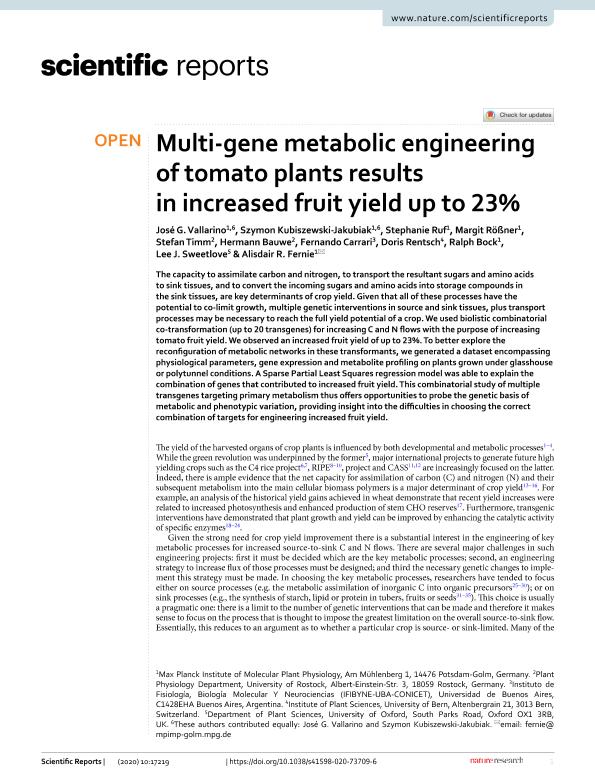Mostrar el registro sencillo del ítem
dc.contributor.author
Vallarino, José G.
dc.contributor.author
Kubiszewski Jakubiak, Szymon
dc.contributor.author
Ruf, Stephanie
dc.contributor.author
Rößner, Margit
dc.contributor.author
Timm, Stefan
dc.contributor.author
Bauwe, Hermann
dc.contributor.author
Carrari, Fernando Oscar

dc.contributor.author
Rentsch, Doris
dc.contributor.author
Bock, Ralph
dc.contributor.author
Sweetlove, Lee J.
dc.contributor.author
Fernie, Alisdair R.
dc.date.available
2021-10-01T23:29:41Z
dc.date.issued
2020-12
dc.identifier.citation
Vallarino, José G.; Kubiszewski Jakubiak, Szymon; Ruf, Stephanie; Rößner, Margit; Timm, Stefan; et al.; Multi-gene metabolic engineering of tomato plants results in increased fruit yield up to 23%; Nature Research; Scientific Reports; 10; 1; 12-2020; 1-18
dc.identifier.issn
2045-2322
dc.identifier.uri
http://hdl.handle.net/11336/142320
dc.description.abstract
The capacity to assimilate carbon and nitrogen, to transport the resultant sugars and amino acids to sink tissues, and to convert the incoming sugars and amino acids into storage compounds in the sink tissues, are key determinants of crop yield. Given that all of these processes have the potential to co-limit growth, multiple genetic interventions in source and sink tissues, plus transport processes may be necessary to reach the full yield potential of a crop. We used biolistic combinatorial co-transformation (up to 20 transgenes) for increasing C and N flows with the purpose of increasing tomato fruit yield. We observed an increased fruit yield of up to 23%. To better explore the reconfiguration of metabolic networks in these transformants, we generated a dataset encompassing physiological parameters, gene expression and metabolite profiling on plants grown under glasshouse or polytunnel conditions. A Sparse Partial Least Squares regression model was able to explain the combination of genes that contributed to increased fruit yield. This combinatorial study of multiple transgenes targeting primary metabolism thus offers opportunities to probe the genetic basis of metabolic and phenotypic variation, providing insight into the difficulties in choosing the correct combination of targets for engineering increased fruit yield.
dc.format
application/pdf
dc.language.iso
eng
dc.publisher
Nature Research
dc.rights
info:eu-repo/semantics/openAccess
dc.rights.uri
https://creativecommons.org/licenses/by/2.5/ar/
dc.subject
Multi‑gene
dc.subject
Metabolic engineering
dc.subject
Tomato plants
dc.subject.classification
Bioquímica y Biología Molecular

dc.subject.classification
Ciencias Biológicas

dc.subject.classification
CIENCIAS NATURALES Y EXACTAS

dc.title
Multi-gene metabolic engineering of tomato plants results in increased fruit yield up to 23%
dc.type
info:eu-repo/semantics/article
dc.type
info:ar-repo/semantics/artículo
dc.type
info:eu-repo/semantics/publishedVersion
dc.date.updated
2021-04-28T21:03:38Z
dc.journal.volume
10
dc.journal.number
1
dc.journal.pagination
1-18
dc.journal.pais
Reino Unido

dc.description.fil
Fil: Vallarino, José G.. Institut Max Planck fur Molekulare Physiologie; Alemania
dc.description.fil
Fil: Kubiszewski Jakubiak, Szymon. Institut Max Planck fur Molekulare Physiologie; Alemania
dc.description.fil
Fil: Ruf, Stephanie. Institut Max Planck fur Molekulare Physiologie; Alemania
dc.description.fil
Fil: Rößner, Margit. Institut Max Planck fur Molekulare Physiologie; Alemania
dc.description.fil
Fil: Timm, Stefan. Universität Rostock; Alemania
dc.description.fil
Fil: Bauwe, Hermann. Universität Rostock; Alemania
dc.description.fil
Fil: Carrari, Fernando Oscar. Consejo Nacional de Investigaciones Científicas y Técnicas. Oficina de Coordinación Administrativa Ciudad Universitaria. Instituto de Fisiología, Biología Molecular y Neurociencias. Universidad de Buenos Aires. Facultad de Ciencias Exactas y Naturales. Instituto de Fisiología, Biología Molecular y Neurociencias; Argentina
dc.description.fil
Fil: Rentsch, Doris. University of Bern; Suiza
dc.description.fil
Fil: Bock, Ralph. Institut Max Planck fur Molekulare Physiologie; Alemania
dc.description.fil
Fil: Sweetlove, Lee J.. University of Oxford; Reino Unido
dc.description.fil
Fil: Fernie, Alisdair R.. Institut Max Planck fur Molekulare Physiologie; Alemania
dc.journal.title
Scientific Reports
dc.relation.alternativeid
info:eu-repo/semantics/altIdentifier/doi/http://dx.doi.org/10.1038/s41598-020-73709-6
dc.relation.alternativeid
info:eu-repo/semantics/altIdentifier/url/https://www.nature.com/articles/s41598-020-73709-6
Archivos asociados
